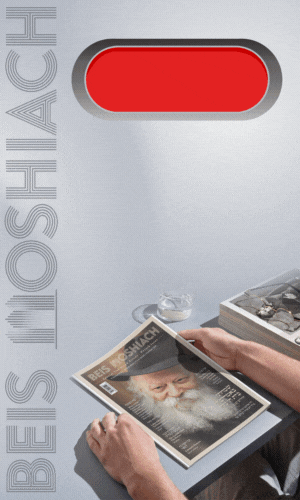Redemption From Affluence And Abundance
I recently read an article by a frum writer who described meeting someone who works as a psychologist in the Los Angeles area. When he asked what are the most difficult cases he sees in his practice, the man did not hesitate for a second and said that it was the children of phenomenally wealthy parents who had neither the time nor interest to be involved in the lives of their kids and just tried to buy them off with money and stuff • By Rabbi Zvi Homnick, Beis Moshiach Magazine • Full Article
Rabbi Zvi Homnick, Beis Moshiach
It was a bright sunny day as a chassan was walking towards the chuppa accompanied by his father and soon-to-be father-in-law. Suddenly, there was a splat on his hat, and everybody looked up and realized that a bird flying overhead had just done his business on the man of the hour.
The chassan looked heavenward and called out, “Thank you, Hashem.” The father-in-law reacted in surprise and asked, “What are you thanking Hashem for?” To which the chassan replied, “I am thanking Hashem that he made it so that cows don’t fly.”
AFFLUENCE AND ABUNDANCE IN EXILE
There is a Yiddish expression that sort of encapsulates the secret of Jewish survival through the seemingly endless dark years of galus, “Ah dank dem Aibishter, abi nisht erger – thank G-d, at least things are not worse.” The ability to find things to be grateful for in difficult times, rather than to wallow in doom and gloom, is a wonderful trait and an important ingredient in the service of Hashem, as evidenced by the many things that Dovid HaMelech found to sing about in Tehillim during the darkest periods of his life.
Beyond that is the ability to experience the secure feeling of bitachon and the joy of anticipation of impending salvation from the challenging situations that one confronts in life. This too is expressed most stirringly by Dovid HaMelech in Tehillim. And of course, we are all familiar with the example of the Jewish women in Mitzrayim who prepared tambourines to celebrate the miracles of redemption that were sure to come.
Beyond even that is the ability to feel a greater yearning for closeness to Hashem in the trials and tribulations of life than during times of tranquility. Here again, it is Dovid HaMelech pouring his soul out in song who expresses this in the words, “My soul thirsts for You, my flesh longs for You; in a parched and thirsty land with no water. Thus to have beheld You in the Holy (Sanctuary), to see Your might and glory.”
Although the literal meaning of “Thus to have beheld You in the Holy” is specifying what my soul thirsts for and what my flesh longs for, the Baal Shem Tov offers us a deeper explanation. He explains that the word “thus” should be read as “if only thus,” meaning that “if only” I would have the same thirst and longing for You when in the Holy as I have now in the Judean desert when being pursued by my enemies. It is in that spirit that Chassidus is so focused on revealing the light within the darkness and beyond that, turning the darkness itself into light.
However, what these traits have in common is that they come to the fore only in times and situations that are less than optimal, and the accompanying prayers for salvation and redemption are a call to Hashem to extricate me from those very situations. Chassidus (more emphatically in the teachings of the Rebbe), which reveals the inner dynamic of every reality, explains that the ultimate ideal of the Ultimate Redemption is not when it comes from a place of yearning to be saved from less than pleasant circumstances, physical or spiritual, but rather from a place of yearning for “I want nothing else but You alone.”
This can be seen in the talks of the Rebbe throughout the years, as the Rebbe would emphasize repeatedly the idea that Jews should and will have abundance in both the material and the spiritual spheres in the final days preceding the Geula. Superficially, one might conclude that the Rebbe is just speaking as a caring and loving leader who just wants his people to have it good in life.
However, as the Rebbe himself made clear time and again, the Chabad Rebbeim did not take on the easy jobs for themselves and their Chassidim. In fact, this is in some ways the hardest job of all, to have material and spiritual affluence and abundance and to do the inner work to reach the point that “I don’t want them at all… I want nothing else but You alone.”
THE AFFLUENCE AND ABUNDANCE BLUES
But what about the “inner galus in Avodas Hashem” that the Rebbe cried out about? And what about “the doubled and redoubled darkness” that the Rebbe was always going on about?
My father, Rabbi Moshe Homnick (may I serve as an atonement for his repose), who worked as a psychologist, would tell about the first patient that came to him when he first opened his private practice in the 1960s as a man in his mid 30’s. (Back in those years, he felt that he would not be able to attract any clients if he appeared openly religious, so he consulted a number of gedolim who said that he could maintain an outward appearance that belied his frumkeit. To this end, he had a special yarmulka wig made to order by a professional who did hairpieces for stage actors.)
This young man walked into his office and immediately broke down in tears. He described how his mother had passed away and his wealthy father now had a new woman in his life. Since his father and his new lady did not want him around, he was given an insanely huge monthly allowance, an apartment and a luxury car, and the freedom to do whatever he liked with his life. He was also welcome to ask for anything else he wanted or needed at any time (more money, cars, etc), the only requirement was that he stay away from them.
Crying and blubbering, he started to pull out huge wads of cash from all of his pockets and throw them down on the floor screaming, “What do I need all this for? I don’t want money and stuff, I just want my father.” My father told me that as shocked as he was by the amounts of money that were strewn about his office, what shocked him even more was the realization that affluence and abundance could be an even greater source of pain than poverty and deprivation.
I recently read an article by a frum writer who described meeting someone who works as a psychologist in the Los Angeles area. When he asked what are the most difficult cases he sees in his practice, the man did not hesitate for a second and said that it was the children of phenomenally wealthy parents who had neither the time nor interest to be involved in the lives of their kids and just tried to buy them off with money and stuff. These kids are starved for love and psychology has very little to offer them.
We are living in a time when many young people who grew up in relative affluence and abundance are convinced that the entire society needs to be torn down and reordered, because of a few cases when career criminals ran afoul of the police and came to an unhappy end. Is that really what is bothering them, or is it that something fundamental is missing from their lives that affluence and abundance does not mitigate, and maybe even exacerbates?
We know that the physical world is only a reflection of the higher spiritual reality, so what the Rebbe (and the world) is telling us is that the problem is not the affluence and abundance itself. In fact, affluence and abundance are wonderful things but only if I have my “Father” too. If I were forced to choose, then “I don’t want them at all… I want nothing else but You alone.” Geula means the removal of the apparent contradiction and that I no longer have to choose between “them” and “You alone.”
The period that we are living in now is not about looking for ways make Chassidus “relevant” by “applying” it to address galus “problems.” Now is when we are supposed to see (and if need be reveal) the material and spiritual affluence and abundance that is available to us, and to utilize them in the context in which they were given to us, as an expression of Hashem’s love, and to realize that all He wants is to fully express that love by revealing Himself to us. It is only that He is giving us time to prepare ourselves so that as overwhelmed as we will be by that revelation we will still be able to receive it. With Hashem’s help, we hope to explore this in more detail in this series of articles.
*
The magazine can be obtained in stores around Crown Heights. To purchase a subscription, please go to: bmoshiach.org
86
Join ChabadInfo's News Roundup and alerts for the HOTTEST Chabad news and updates!










































